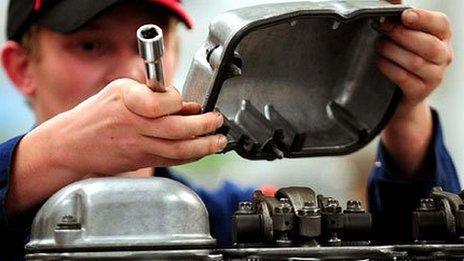Pupils in some areas are not offered 'vital' GCSEs
- Published
- comments
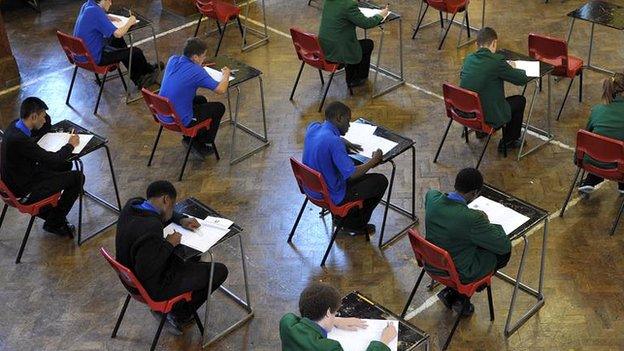
The research shows pupils in some areas do not have access to important subjects
Pupils in some parts of England are unlikely to take exams that could be vital to their job prospects - such as sciences and languages - according to an analysis of exam results.
Researchers examined GCSE statistics from 2013 and found in some authorities a third of schools did not offer triple science.
There are concerns such "subject deserts" could harm social mobility.
The government said thousands more pupils were now taking core subjects.
Sir Peter Lampl, chairman of the Sutton Trust education charity, said these were "very worrying findings" and further evidence of the "bleak correlation between educational opportunities and geography".
The analysis showing big variations in subject take-up has been carried out by the Open Public Services Network, which provides an independent assessment of public sector performance data.
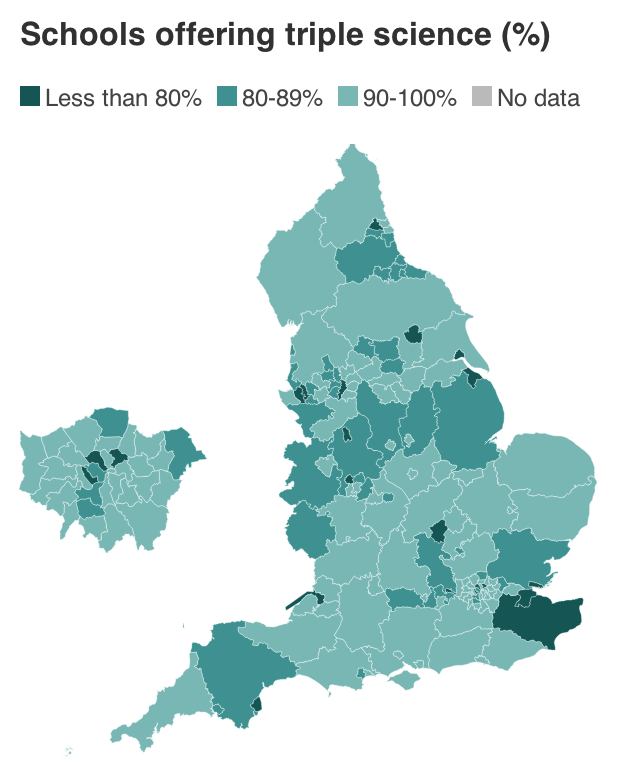
Source: Open Public Services Network, National pupil database analysed by Fischer Family Trust
Even if pupils have ability, they can face a lack of availability, with a wide variation in subjects offered by schools.
The study found that children in Kensington were four times more likely to be enrolled for a language GCSE than children in Middlesbrough.
And in terms of science, if pupils cannot take triple science - which leads to three separate GCSEs in physics, chemistry and biology - it can make it more difficult to take A-level science subjects needed for careers such as medicine.
'Challenging subjects'
There were six authorities where more than a third of schools did not offer triple science - Medway, Slough, Newcastle upon Tyne, Kingston-Upon-Hull, Knowsley and North East Lincolnshire.
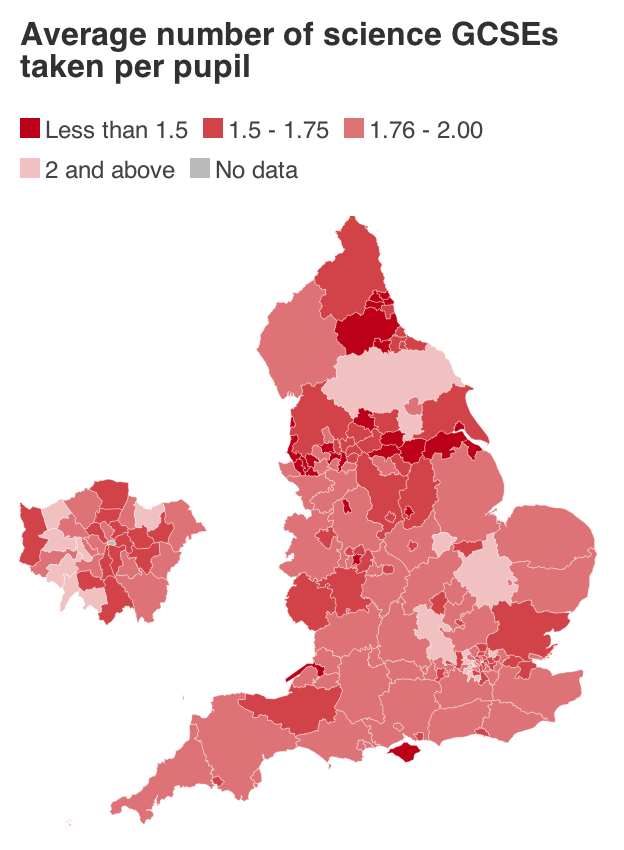
Source: Open Public Services Network, National pupil database analysed by Fischer Family Trust
This "severely limits" options after GCSEs and beyond school, says the research.
There are big differences in the proportion of pupils taking any sciences, with low take-up in parts of the North East and North West and coastal areas such as the Isle of Wight.
The findings show how opportunities can be "restricted because all the schools within a neighbourhood have decided not to offer more challenging subjects", said researcher Roger Taylor.
"We can see that the curriculum taught to children in poorer parts of Britain is significantly different to that taught in wealthier areas."
Restricted choices
Mr Taylor said there were concerns pressure on schools to perform well in league tables could be a factor - and that this is shaping choices rather than pupils' needs.
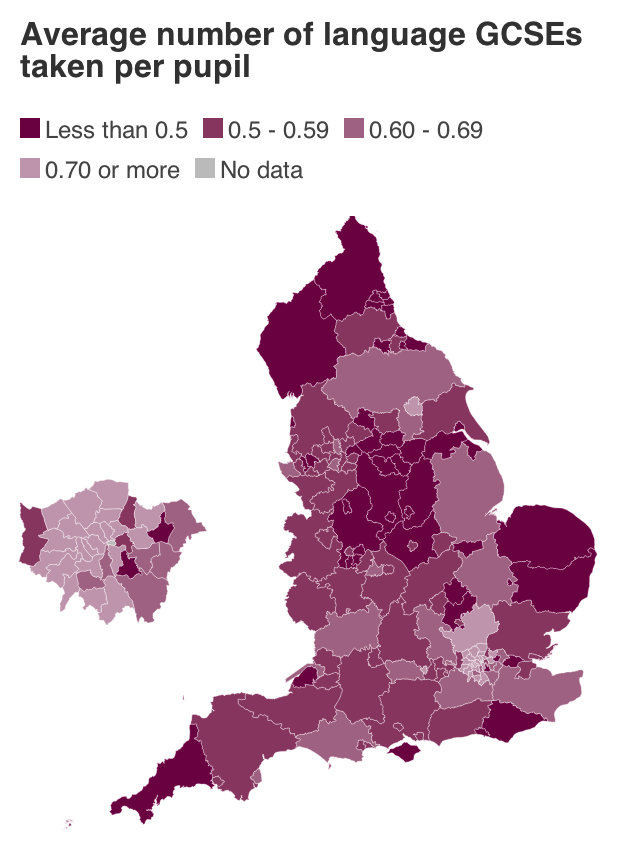
Source: Open Public Services Network, National pupil database analysed by Fischer Family Trust
"Our worry is that instead they reflect decisions made by schools and are based on calculations as to how schools can appear better on league tables by encouraging children to avoid taking on more challenging subjects.
"The evidence suggests that in areas where most children are expected to do less well in exams, the educational opportunities for all children are being restricted."
Science subjects can be the key to many career paths, says Brett Wigdortz, chief executive of Teach First, but the lack of access to triple science can also reflect shortages of specialist staff.
"As the demand for science teachers often outstrips supply, we know that many schools are simply unable to offer pupils triple sciences. This is especially true in schools serving low-income communities where teacher recruitment in most subjects faces challenges," said Mr Wigdortz.
Bucking the trend
The study, funded by Leeds City Council, shows that in four authorities - Hartlepool, Barnsley, Kingston-upon-Hull and Knowsley - fewer than 15% of pupils took triple science.
At the other end of the scale, there were more than 40 authorities where every school offered triple science.
The three authorities with the highest proportion of pupils taking triple science were Sutton, Buckinghamshire and Bournemouth.
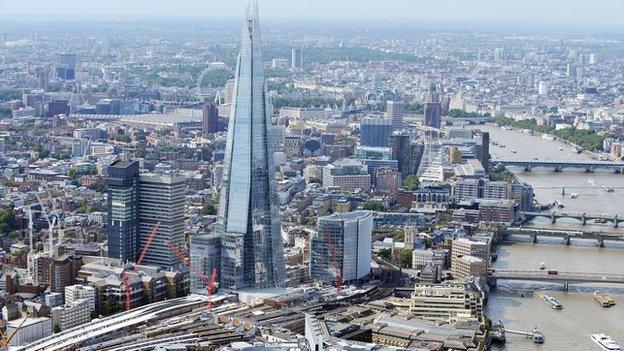
There are higher levels of language learning in London than much of the rest of England
There is a link to deprivation and affluence - with schools in wealthier areas more likely to offer triple science.
But there are also cases of authorities bucking the trend, with inner London boroughs such as Lewisham and Brent among the best in the country for the take-up of triple science.
Those with the lowest proportions of pupils enrolled in triple science are also scattered across the country. The bottom 20 include the Isle of Wight, Middlesbrough and Havering.

Triple v double science at GCSE
•Triple science: pupils study physics, chemistry and biology as separate subjects, gain three GCSEs (one in each subject) and can progress to science A-levels
•Double science: pupils take a combination of physics, chemistry and biology and gain two science GCSEs. They can still progress to science A-levels, but the Association of Science Educators says there is evidence they are less likely to do so

Modern languages have been seen as valuable for widening job opportunities.
But this breakdown of GCSEs shows huge regional disparities. The top 20 local authorities for pupils taking modern languages are almost all in inner or outer London.
In Middlesbrough, only about one in four pupils studied a language at GCSE, while in authorities such as Hammersmith and Fulham and Kensington and Chelsea "nearly every pupil is taking at least one language".
The researchers highlight very different results from authorities with similar levels of deprivation.
The proportion of free school meal pupils in Hammersmith and Fulham is broadly similar to Knowsley. But the west London borough has more than three times as many pupils taking triple science, almost twice as many taking at least one science and more than double the level of entries for languages.
Sir Peter Lampl said: "One important reason why bright children from low and middle income pupils miss out on the best universities is that they don't take the right subjects at school. It is vital that teachers give the right advice so that young people know what subjects they need to take.
"These new findings highlight even more the bleak correlation between educational opportunities and geography. If we are really committed to ensuring that all young people have access to a good education, we need to improve the quality of schools, particularly in the north and coastal areas."
A spokesman for the Department for Education said: "As a result of our plan for education we are seeing thousands more pupils taking the core academic GCSEs and A levels - those that open doors to future success.
"We want all young people to have access to these rigorous subjects - regardless of where they live. Our recent GCSE performance tables showed that 90,000 more pupils took the challenging English Baccalaureate compared to 2010, an increase of 71% in four years."
Labour's shadow education secretary Tristram Hunt said Britain needed "to make the most of the talents of all our young people".
"But under David Cameron's schools policy, careers advice has been stripped out, teacher recruitment for physics and maths is reaching crisis point and escalating numbers of unqualified teachers mean that for too many pupils, teaching is being done on the cheap.
"Labour will expand opportunity for every child, not just a privileged few, by delivering a qualified teacher in every classroom and making sure that children have access to a broad and balanced curriculum, equipping them for a successful future."
Maps produced by Marcello Zanni
- Published7 January 2011
- Published16 May 2014
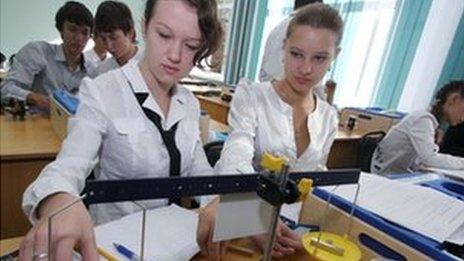
- Published18 November 2013
